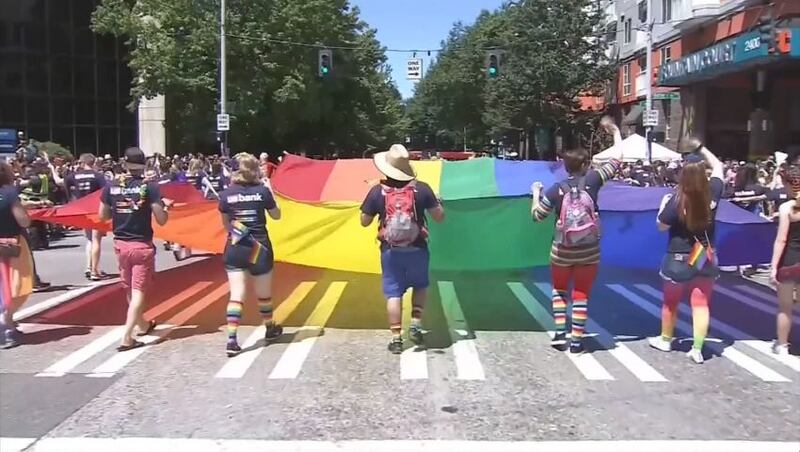SEATTLE — In honor of Pride Month, KIRO 7 is celebrating the contributions of the LGBTQIA community past, present and future.
Pioneer Square’s queer history is largely invisible, but historian and UW Ph.D. candidate Julian Barr is preserving it through stories and with an interactive map.
“Before the Stonewall riots in New York, and Pride starts in the ’70s, there are a lot more going on. There’s a long history of queer folks coming together, finding space, living a life,” said Barr.
On a quest to reach a wider audience, Barr created “Pioneer Square and the Making of Queer Seattle,” an interactive digital story map. Before the pandemic, Barr was also giving walking tours to those seeking a more in-depth experience to understand how the city’s “first neighborhood” developed into a queer community in the late 1800s. Pointing out the transformation of the neighborhood and the stories of their disappearance.
“It’s not being treated well, the city kind of doesn’t care about it. But that’s the opening, that’s when you can have a little bit more freedom to make a bar in a basement where gay (people) and lesbians are gathering. It had this reputation of being things like seedy… but in reality, it’s opening that door,” said Barr.
Barr notes Pioneer Square became a gathering place for the LGBTQIA community. In the 1930s, bars and clubs started to open including the Double Header, the Casino and Six Eleven Tavern. At the time, same-sex dancing was not legal, so these establishments like many others would pay off police.
“They are doing this other thing that caused a lot of instability for the bars. It was a ton of money. You couldn’t succeed, you have to get really popular to succeed, so it’s this other form of harassment,” said Barr.
In the late ’60s the police payoffs were ultimately exposed to the FBI and legislation was passed to stop the harassment.
“Queer history matters so much more before Stonewall and after. Both time periods are so essential because you wouldn’t have had things like Pride here in Seattle in the ’70′s which started in Pioneer Square if it wasn’t before the decades before,” said Barr.
Occidental Park in the heart of Pioneer Square was also iconic for the queer community. It was the location for the first Seattle Pride parade in 1974. In 1978, it was a place for protests and political organizing, ultimately blocking Initiative 13 to uphold gay and lesbian rights.
“All these organizations really focused here in Pioneer Square was because of its long queer history and getting folks involved and getting the community involved, and it worked, it did not pass,” said Barr.
Barr’s mission to share his knowledge has been especially enlightening for the younger generation.
“That really genuine excitement to know what was past life like and what does that mean especially when you’ve grown up in a world where you’ve had marriage equality for a pretty extensive time now, but what does that mean when you didn’t have any of that,” said Barr.
And while the neighborhood may not physically reflect its rich LGBTQIA history, Barr is committed to making sure the stories and memories are being passed on and preserved.
To check out Barr’s “Pioneer Square and the Making of Queer Seattle” interactive map.
©2021 Cox Media Group








